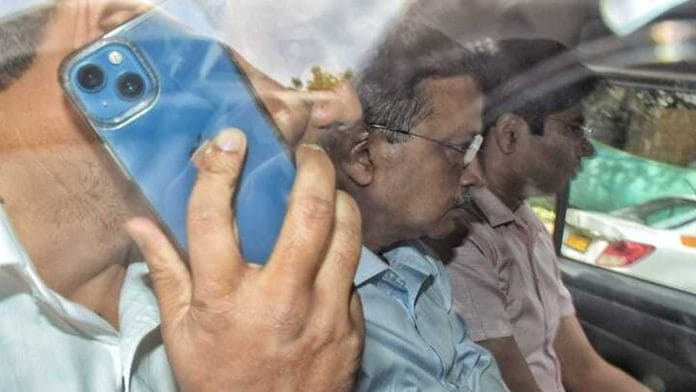New Delhi: The Enforcement Directorate (ED) Thursday opposed the Supreme Court’s suggestion of granting bail to Delhi Chief Minister Arvind Kejriwal to participate in poll campaigns in the ongoing Lok Sabha election.
The anti-money laundering agency filed an affidavit in the top court in which it said that the “right to campaign for an election is neither a fundamental right nor a constitutional right and not even a legal right.” The submission in writing comes a day before the apex court is expected to pronounce its decision on grant of interim bail to Kejriwal.
Arrested and jailed in connection with the Delhi liquor policy case, Kejriwal’s plea is before the top court questioning the ED’s move to take him into custody and his remand. He approached the SC after he lost his case before the trial court and the High Court.
A bench led by Justice Sanjiv Khanna Tuesday indicated it may consider granting bail to Kejriwal, but only for participating in the electoral process, implying the Delhi CM would not be allowed to sign official files.
As for arguments on the questions of law arising in the petition, the court said that it would hear sometime later, maybe next week.
During the hearing both Solicitor General Tushar Mehta and Additional Solicitor General S.V. Raju had urged the court to hear them on the grant of interim bail as well and warned them against treating Kejriwal as a special class of citizen.
Also Read: Why was Arvind Kejriwal arrested ahead of Lok Sabha polls, Supreme Court asks ED
‘No entitled to differential treatment’
Repeating their oral arguments, the ED’s affidavit emphasises that Kejriwal cannot claim a higher status than an ordinary citizen and was not entitled to a differential treatment.
It said there was no precedent from the past to support Kejriwal’s demand to free him on interim bail so that he can campaign for his party. No political leader has been granted interim bail for campaigning even though he is not the contesting candidate, the agency stated.
Even a contesting candidate cannot be granted interim bail for his own campaigning, the agency asserted. Kejriwal’s release on interim bail on the ground that he has to be part of the ongoing elections will create a precedent, which, the ED said, “will permit all unscrupulous politicians to commit crimes, avoid investigation under the garb of elections.”
The ED invoked the SC’s order that rejected Kejriwal’s colleague and AAP leader Manish Sisodia’s bail plea to convince the bench to reconsider its intention. The paragraph cited from that order says: “Rule of law means that laws apply equally to all citizens and institutions, including the State. Rule of law requires an equal right to access to justice for the marginalised. The rule also mandates objectives and fair treatment to all.”
The order denying bail to Sisodia was written by Justice Khanna, who heads the bench hearing Kejriwal’s plea.
The ED affidavit further referred to the Representation of the People’s Act to point out that even the right to vote of a person gets curtailed when he/she is in judicial custody. This even as the right to vote is considered as a statutory or constitutional right, it added.
“It is pertinent to note that around 123 elections have taken place in the last 5 years and if interim bail is to be granted for the purpose of campaigning in an election, then no politician can be arrested and kept in judicial custody since elections are all year round phenomena,” the ED submitted.
Grant of bail will work against the rule of law as there are many politicians who are in judicial custody for money laundering offences and whose custody is under scrutiny of various courts, it added. Therefore, there is “no reason why a special prayer for a special treatment by the petitioner (Kejriwal) be acceded to.”
“If the petitioner is extended any interim relief on account of him being a politician for the purposes of campaigning in general elections for his party, there is no gain saying that all politicians incarcerated in some cases or the other would not seek a similar treatment claiming that politicians are a class of their own,” the ED said.
An order extending any special concession would also discriminate against a small farmer or a trader as it would give importance to the special class of politicians, the ED said, requesting the court to conclude its hearing of Kejriwal’s petition and pronounce a final verdict.
Given that Kejriwal had avoided the ED summons, the agency said interim bail to him would be giving “judicial imprimatur” (official permission) to his actions.
(Edited by Tony Rai)
Also Read: ‘ED remand justified to unearth layers of conspiracy’ — what HC said to uphold Kejriwal’s arrest






